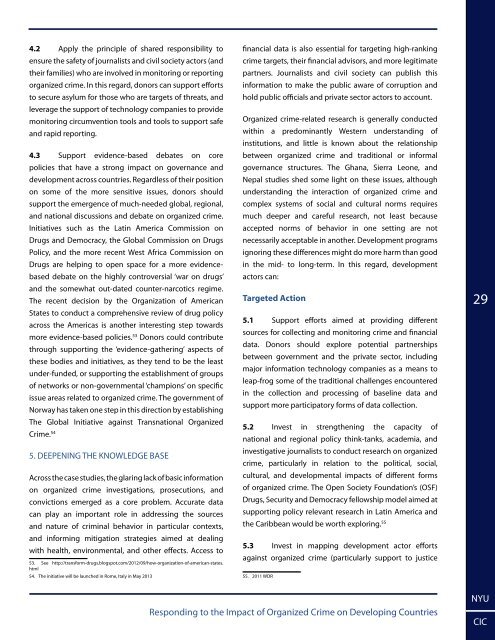here - Center on International Cooperation - New York University
here - Center on International Cooperation - New York University
here - Center on International Cooperation - New York University
Create successful ePaper yourself
Turn your PDF publications into a flip-book with our unique Google optimized e-Paper software.
4.2 Apply the principle of shared resp<strong>on</strong>sibility to<br />
ensure the safety of journalists and civil society actors (and<br />
their families) who are involved in m<strong>on</strong>itoring or reporting<br />
organized crime. In this regard, d<strong>on</strong>ors can support efforts<br />
to secure asylum for those who are targets of threats, and<br />
leverage the support of technology companies to provide<br />
m<strong>on</strong>itoring circumventi<strong>on</strong> tools and tools to support safe<br />
and rapid reporting.<br />
4.3 Support evidence-based debates <strong>on</strong> core<br />
policies that have a str<strong>on</strong>g impact <strong>on</strong> governance and<br />
development across countries. Regardless of their positi<strong>on</strong><br />
<strong>on</strong> some of the more sensitive issues, d<strong>on</strong>ors should<br />
support the emergence of much-needed global, regi<strong>on</strong>al,<br />
and nati<strong>on</strong>al discussi<strong>on</strong>s and debate <strong>on</strong> organized crime.<br />
Initiatives such as the Latin America Commissi<strong>on</strong> <strong>on</strong><br />
Drugs and Democracy, the Global Commissi<strong>on</strong> <strong>on</strong> Drugs<br />
Policy, and the more recent West Africa Commissi<strong>on</strong> <strong>on</strong><br />
Drugs are helping to open space for a more evidencebased<br />
debate <strong>on</strong> the highly c<strong>on</strong>troversial ‘war <strong>on</strong> drugs’<br />
and the somewhat out-dated counter-narcotics regime.<br />
The recent decisi<strong>on</strong> by the Organizati<strong>on</strong> of American<br />
States to c<strong>on</strong>duct a comprehensive review of drug policy<br />
across the Americas is another interesting step towards<br />
more evidence-based policies. 53 D<strong>on</strong>ors could c<strong>on</strong>tribute<br />
through supporting the ‘evidence-gathering’ aspects of<br />
these bodies and initiatives, as they tend to be the least<br />
under-funded, or supporting the establishment of groups<br />
of networks or n<strong>on</strong>-governmental ‘champi<strong>on</strong>s’ <strong>on</strong> specific<br />
issue areas related to organized crime. The government of<br />
Norway has taken <strong>on</strong>e step in this directi<strong>on</strong> by establishing<br />
The Global Initiative against Transnati<strong>on</strong>al Organized<br />
Crime. 54<br />
5. DEEPENING THE KNOWLEDGE BASE<br />
Across the case studies, the glaring lack of basic informati<strong>on</strong><br />
<strong>on</strong> organized crime investigati<strong>on</strong>s, prosecuti<strong>on</strong>s, and<br />
c<strong>on</strong>victi<strong>on</strong>s emerged as a core problem. Accurate data<br />
can play an important role in addressing the sources<br />
and nature of criminal behavior in particular c<strong>on</strong>texts,<br />
and informing mitigati<strong>on</strong> strategies aimed at dealing<br />
with health, envir<strong>on</strong>mental, and other effects. Access to<br />
53. See http://transform-drugs.blogspot.com/2012/09/how-organizati<strong>on</strong>-of-american-states.<br />
html<br />
54. The initiative will be launched in Rome, Italy in May 2013<br />
financial data is also essential for targeting high-ranking<br />
crime targets, their financial advisors, and more legitimate<br />
partners. Journalists and civil society can publish this<br />
informati<strong>on</strong> to make the public aware of corrupti<strong>on</strong> and<br />
hold public officials and private sector actors to account.<br />
Organized crime-related research is generally c<strong>on</strong>ducted<br />
within a predominantly Western understanding of<br />
instituti<strong>on</strong>s, and little is known about the relati<strong>on</strong>ship<br />
between organized crime and traditi<strong>on</strong>al or informal<br />
governance structures. The Ghana, Sierra Le<strong>on</strong>e, and<br />
Nepal studies shed some light <strong>on</strong> these issues, although<br />
understanding the interacti<strong>on</strong> of organized crime and<br />
complex systems of social and cultural norms requires<br />
much deeper and careful research, not least because<br />
accepted norms of behavior in <strong>on</strong>e setting are not<br />
necessarily acceptable in another. Development programs<br />
ignoring these differences might do more harm than good<br />
in the mid- to l<strong>on</strong>g-term. In this regard, development<br />
actors can:<br />
Targeted Acti<strong>on</strong><br />
5.1 Support efforts aimed at providing different<br />
sources for collecting and m<strong>on</strong>itoring crime and financial<br />
data. D<strong>on</strong>ors should explore potential partnerships<br />
between government and the private sector, including<br />
major informati<strong>on</strong> technology companies as a means to<br />
leap-frog some of the traditi<strong>on</strong>al challenges encountered<br />
in the collecti<strong>on</strong> and processing of baseline data and<br />
support more participatory forms of data collecti<strong>on</strong>.<br />
5.2 Invest in strengthening the capacity of<br />
nati<strong>on</strong>al and regi<strong>on</strong>al policy think-tanks, academia, and<br />
investigative journalists to c<strong>on</strong>duct research <strong>on</strong> organized<br />
crime, particularly in relati<strong>on</strong> to the political, social,<br />
cultural, and developmental impacts of different forms<br />
of organized crime. The Open Society Foundati<strong>on</strong>’s (OSF)<br />
Drugs, Security and Democracy fellowship model aimed at<br />
supporting policy relevant research in Latin America and<br />
the Caribbean would be worth exploring. 55<br />
5.3 Invest in mapping development actor efforts<br />
against organized crime (particularly support to justice<br />
55. 2011 WDR<br />
29<br />
Resp<strong>on</strong>ding to the Impact of Organized Crime <strong>on</strong> Developing Countries<br />
NYU<br />
CIC
















